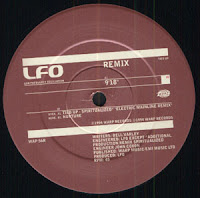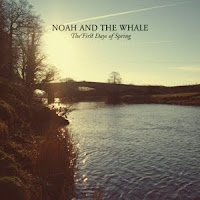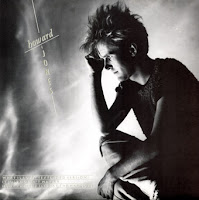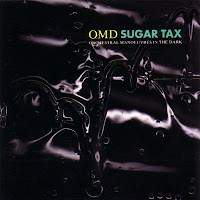Both albums, coincidentally, are 'tributes' of sorts to women. In Wainwright's case that woman is a character played by actress Louise Brooks in the 1929 movie Pandora's Box, but also serves as a tribute of sorts to his mother, the late Kate McGarrigle, who passed away at the start of this year; whereas Byrne's album depicts the life of shoe-addicted dictator's wife, Imelda Marcos and juxtaposes that with the life of Estrella Cumpas, the woman who raised her.

Both also have their origins in theatre. Byrne's project with Fatboy Slim was originally conceived as a performance (albeit in nightclubs), while Wainwright's recent opera success with Prima Donna and love of all things Wagner has informed much of his work; the live performance of All Days Are Nights I went to on 13 April at Sadler's Wells saw Wainwright performing the entire album, almost faultlessly, in a 17ft ball-gown as a song cycle with the express request to the audience not to applaud until he had left the stage; theatrical indeed. As an album, All Days Are Nights sits neatly into Wainwright's opera-inspired oeuvre, and despite being just the man and a piano, is his most dramatic album to date. Mrs S says it's dreary, and at times it is certainly more plaintive and reflective than previous albums (check out the takes on three Shakespeare sonnets), but it is also by subtle shades uplifting and humorous (as on the most upbeat piece 'Give Me What I Want And Give It To Me Now' or the positively euphoric start to 'The Dream'). My personal favourites are the opener, 'Who Are You New York?', a ruminative long song to the City itself, and 'Martha', a song whose lyrics comprise the answer machine messages left by Rufus to his sister while their mother's illness worsened; it also signals the recent tentative reconciliation, through grief, of Rufus and his father Loudon.

Perhaps not as instantly, and bombastically accessible as previous Wainwright fare, All Days Are Nights is probably the most authentic, personal album Wainwright has produced thus far. Previous albums have always featured pieces for piano only, and in the live setting are always firm favourites with the audience (especially when Wainwright messes up, plays the wrong section or ad libs theatrically – think of an extremely camp Les Dawson); in an odd sense, the scaling back of the instruments to just a solitary piano ties in neatly with the reconciliation with his father, who has made it his business to produce album after album of music consisting of just his voice and a guitar.
David Byrne and Rufus Wainwright have worked together once before on a song, and that song was also theatrical in origin. 'Au Fond Du Temple Saint' appeared on Byrne's 2004 album Grown Backwards. The former Talking Heads front man's voice may have not been perfectly matched to Wainwright's dexterity on this piece from Bizet's Les Pêcheurs de Perles but all I wanted was a segue in this blog from one album to the other, and that seemed to work. Plus, more earnestly, the idea of Byrne tackling an opera track would – when watching the videos for 'Road To Nowhere' or 'Once In A Lifetime' – have seemed nonsensical; however, Byrne was an art student before starting Talking Heads and his interest in all manner of art forms is manifest (check his blog for the proof). And so I stand by my segue. The other possible one would have been Martha Wainwright, who is one of the female vocalists employed by Byrne on this project.

Of this album, critics have dubbed it the most accessible David Byrne album he's produced since the Talking Heads days, thanks to the input of Fatboy Slim, but I'd disagree; yes, it's more obviously 'pop' than other Byrne albums, but with the exception of albums like My Life In The Bush Of Ghosts (with Eno) or Big Love: Hymnal, Byrne is no stranger to traditional song structures, albeit conceived with his typical vision and the odd Brazilian flavour here and there. Plus Talking Heads weren't exactly what I'd describe as 'pop' anyway.
It certainly sounds more like a Byrne album that a Fatboy Slim one, but it serves to remind that Norman Cook is a brilliant producer as well as a purveyor of daft chart-bothering fare. The sound leans to a glossy funky disco blend, which apparently has something to do with Marcos' fondness for Manhattan nightclubs, although I don't know anything about her so can't say if I just made that up or not. I opted for the limited edition version – two CDs, a DVD and a 120 page book detailing the background to each song (which, hands up, I haven't read completely yet therefore this review isn't as well informed as it could have been). The lyrics for each, according to Byrne's typically exhaustive introduction notes, were centred around actual Marcos quotes (so shouldn't she have a writing credit?).

Byrne adds backing vocals to a number of tracks and delivers the superb 'American Troglodyte' himself, but in truth this is a vehicle for the assembled ranks of female vocalists, each hand-picked to provide a depiction of Marcos / Cumpas according to the theme of the song. So you get the likes of Tori Amos, Santigold, Cyndi Lauper, St. Vincent and Florence Welch (who, sans Machine, delivers the gorgeous title track). At 22 tracks it requires quite a commitment on the part of the listener, but it makes most sense when heard in a single sitting. I was really excited about this release, and suffice to say I wasn't disappointed.
Vinyl Corner

LFO 'Tied Up Remixes' (Warp Records 12”, 1994)
Some people know the Warp label as the home of leftfield bands like Grizzly Bear, Battles and Broadcast; others remember when it was the principal go-to label for the leftfield electronica of Aphex Twin, Autechre, Sweet Exorcist and the duo of Mark Bell and Gez Varley – LFO – whose Steve Wright-bothering sub-bass anthem 'LFO' kicked the Sheffield label into existence.
From humble origins as a behind-the-counter indie label at a Sheffield record store, Warp has become a well-respected, broad-minded label that's also branched out successfully into film, examples including the new Chris Morris movie Three Lions and the excellent documentary A Complete History Of My Sexual Failings.
Label owner Steve Beckett mentioned in a recent Esquire interview that after a while he began to find the slew of acts producing electronica in the Aphex template – which could be summarised crudely as distorted beats and glacial synths – wearying. He began to turn his ears towards the kind of alternative rock music being produced by the likes of Jason Pierce's Spiritualized; as such, this out-of-print Warp 12", remixed by Pierce, could well represent the point the label began to think more eclectically.
Pierce's nine-minute mix is a beautiful thing, a phasing and shifting drone work that has little or nothing to do with the harshness of the original. I'd call it 'ambient', and it does share much with Eno's brand of 'discreet' music, but it also has a depth best observed by listening on headphones.
The B-side, a remix by LFO of their 'Nurture' is more dancefloor-focussed.
I sold my copy of this recently to someone who, coincidentally, works at Warp.


























